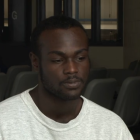
JJIE Presents: The Juvenile Justice Documentary Project, in Partnership with Calamari Productions
|
Aaron, 18 years old and dressed in an oversized, light grey sweatshirt, sits blankly across from Intake Officer Clayton in an Indiana detention center while she asks him questions, his face betraying little emotion and his voice barely above a whisper. “I can’t hear you,” Clayton says, and Aaron repeats his answer, just loud enough for her to hear. As Clayton tells Aaron of an impending charge, shock flickers across his otherwise still face – this was the first he’d heard anything about it. Scenes such as this are common in the work of Calamari Productions. In an effort to continue bringing innovative, accurate insights on juvenile justice, The Juvenile Justice Information Exchange has formed a partnership with this award-winning production.










